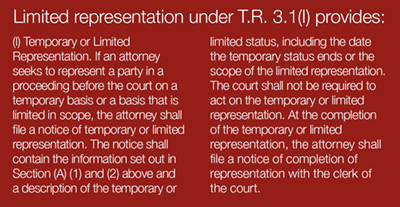
More individuals, primarily for economic reasons, are choosing to represent themselves in court proceedings, which is creating a strain on court staff and judges. Many times these unrepresented litigants find they are in over their head and look for help from the private bar, or pro bono lawyers.
When this happened in the past, lawyers faced a dilemma because of the difficulty in only providing limited representation. But the Indiana Supreme Court amended the Indiana Rules of Trial Procedure to allow unrepresented litigants and others to use limited scope representation without some of the past drawbacks. Indiana attorneys now have an easier time crafting arrangements that allow them to represent clients on a limited basis. An individual can save money on legal fees and better control expenses, while a lawyer can focus on the specific needs of the client.
This article is a reminder that this option exists and is a potential relief to the courts faced with the increasing number of unrepresented litigants.
Indiana Trial Rule 3.1(I) provides for temporary appearances and limited representation in civil cases. Indiana Criminal Rule 2.1(E) provides for temporary appearances, but not limited representation. A rule amendment proposed in 2012 to allow limited representation in criminal cases was not approved by the Supreme Court.
Trial Rule 3.1 (I) dovetails with Indiana Professional Conduct Rule 1.2(c), which provides:

(c) A lawyer may limit the scope and objectives of the representation if the limitation is reasonable under the circumstances and the client gives informed consent.
At the completion of the temporary or limited representation, the attorney is only required to file a notice of completion of the representation with the clerk. The rule specifically provides that the court shall not be required to act on the temporary or limited representation.
No Indiana cases have discussed limited representation as set forth in T.R. 3.1(I).